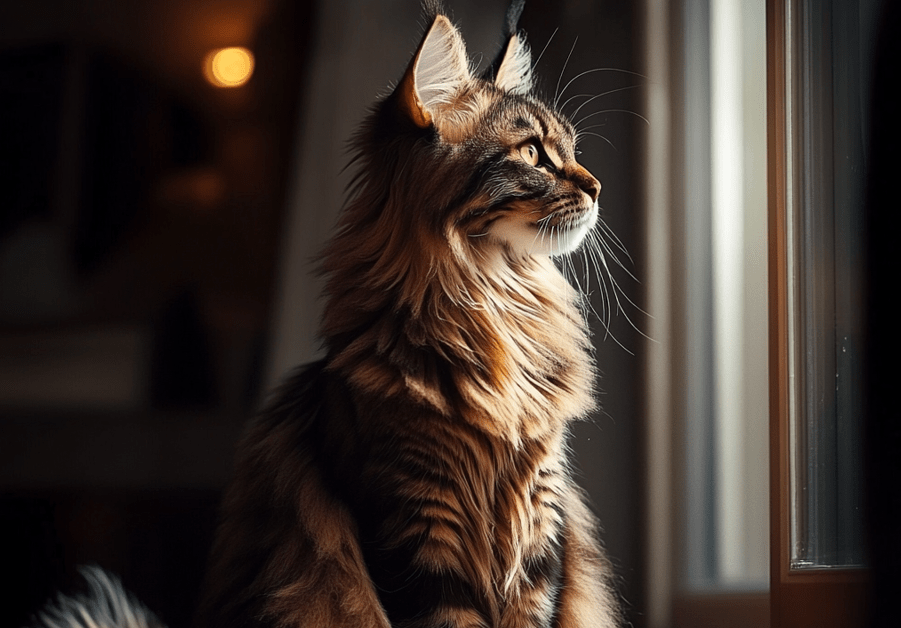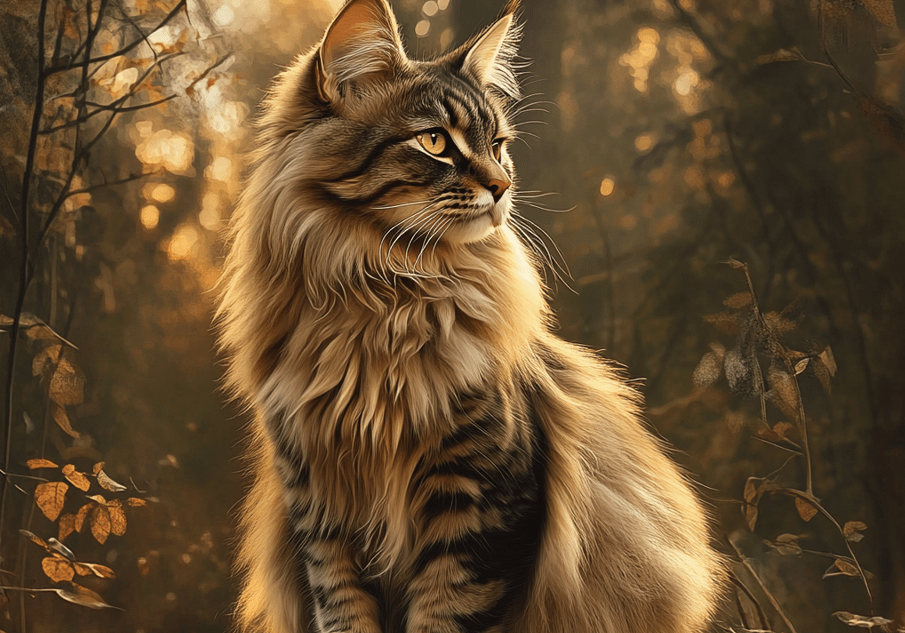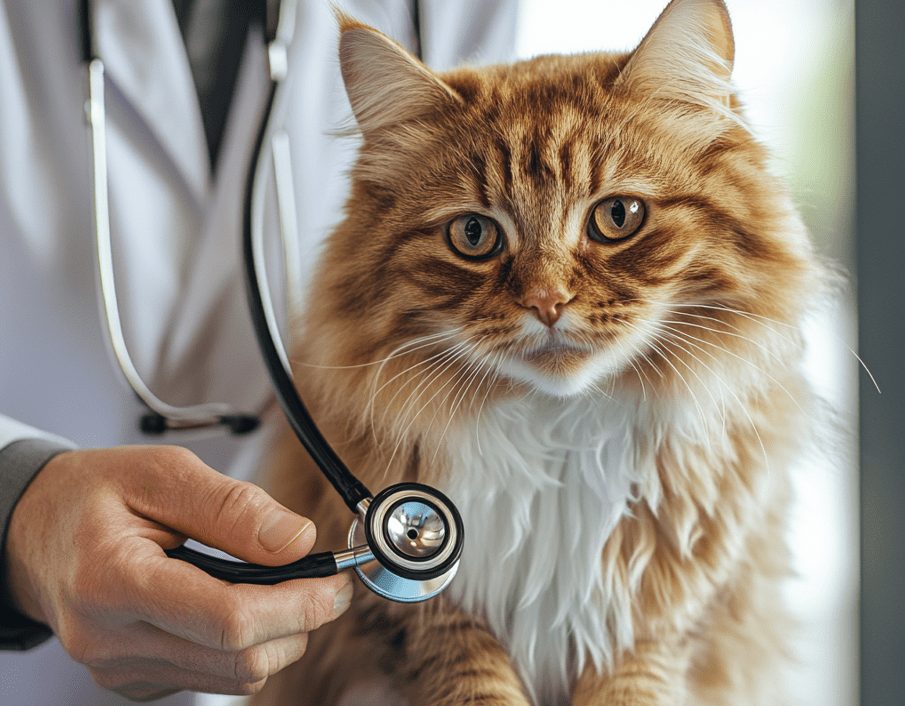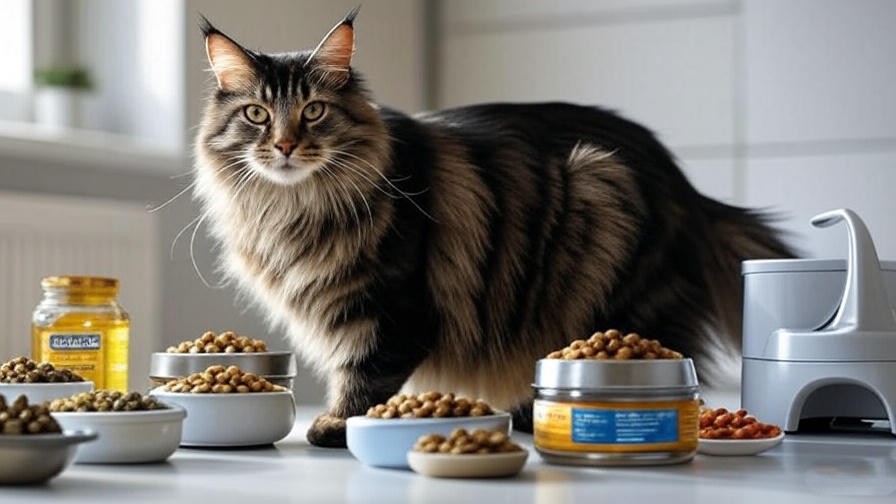
Imagine your majestic Maine Coon, with its lion-like mane and gentle temperament, bounding through your home with endless energy—or struggling with health issues due to an improper diet. The Maine Coon diet is critical for these gentle giants, known for their impressive size and playful personalities. As one of the largest domesticated cat breeds, Maine Coons have unique nutritional needs that differ from smaller felines. A well-balanced diet can prevent obesity, support joint health, and ensure a long, vibrant life. Backed by veterinary expertise and real-world owner experiences, this guide offers practical, science-based tips to craft the perfect Maine Coon diet plan. Whether you’re a new owner or a seasoned caregiver, you’ll find actionable advice to keep your cat thriving.
Understanding the Maine Coon’s Unique Nutritional Needs
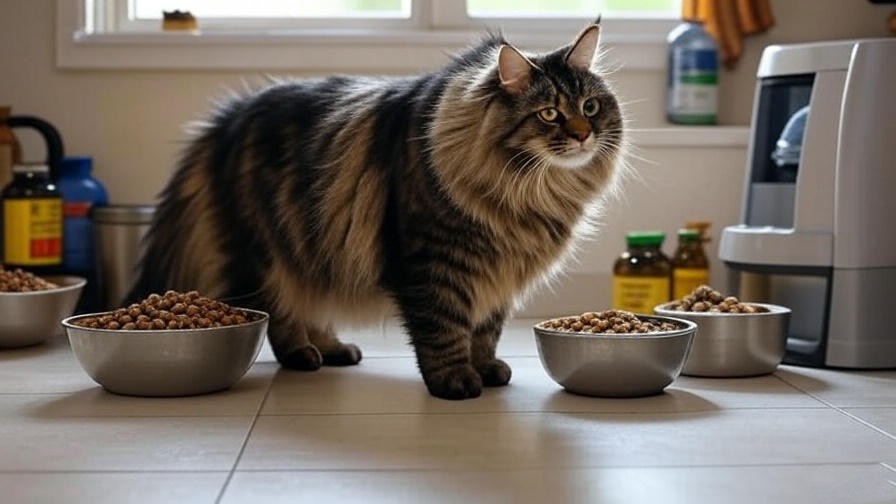
Why Maine Coons Require a Specialized Diet
Maine Coons aren’t just big cats—they’re a breed apart, often weighing 15-25 pounds and growing for up to 5 years. Their size, high energy levels, and predisposition to conditions like hip dysplasia and hypertrophic cardiomyopathy (HCM) demand a tailored Maine Coon diet. Unlike smaller breeds, these cats need higher protein to maintain muscle mass and specific nutrients to support joint and heart health. Their slow growth cycle also means nutritional needs evolve over time, making diet planning essential.
Veterinary Insight: Dr. Jane Peterson, a feline nutrition expert, notes, “Maine Coons’ large frames and active nature require a diet rich in high-quality protein and joint-supporting nutrients to prevent strain and promote longevity.”
Key Nutrients for Maine Coons
A balanced Maine Coon diet hinges on the right mix of nutrients:
- Protein: As obligate carnivores, Maine Coons thrive on animal-based proteins like chicken, turkey, or fish. Aim for foods with at least 30-40% protein to support muscle growth and repair.
- Fats: Healthy fats (e.g., omega-3s from fish oil) provide energy and keep their luxurious coats shiny. Fats should comprise 15-20% of their diet.
- Carbohydrates: Maine Coons need minimal carbs. Excessive grains or fillers can lead to weight gain, especially in less active cats.
- Vitamins and Minerals: Taurine is critical for heart health, while glucosamine and chondroitin support joints, vital for this heavy breed.
LSI Keywords: Maine Coon nutrition, feline dietary needs, large breed cat diet.
Building the Perfect Maine Coon Diet Plan
Wet vs. Dry Food: What’s Best for Maine Coons?
Choosing between wet and dry food is a key decision for Maine Coon owners. Wet food offers superior hydration, crucial for preventing urinary tract issues common in large breeds. Its high moisture content also appeals to picky eaters. Dry food, however, supports dental health and is convenient for free-feeding active Maine Coons. A balanced approach—mixing wet and dry food—often works best, providing hydration and dental benefits while meeting nutritional needs.
Tip: Aim for 2-3 wet food meals daily supplemented with a small portion of high-quality dry kibble. Monitor portions to prevent obesity, a common issue in Maine Coons due to their hearty appetites.
Homemade vs. Commercial Cat Food
Homemade diets allow control over ingredients but require careful planning to avoid nutritional deficiencies. A vet-approved homemade Maine Coon diet might include cooked chicken, organ meats, and a feline-specific supplement. However, commercial foods are often safer and more convenient. Look for AAFCO-approved brands with high protein (e.g., chicken or salmon as the first ingredient) and minimal fillers like corn or soy.
Example: A premium commercial food might list “deboned chicken, chicken meal, fish oil” as top ingredients, ensuring protein and omega-3s for your Maine Coon.
Feeding Frequency and Portion Sizes
Maine Coons’ feeding schedules vary by life stage:
- Kittens (0-3 years): Feed 4-6 small meals daily to support rapid growth. Use kitten-specific formulas with high calories (around 100 kcal per pound of body weight).
- Adults (3-10 years): Offer 2-3 meals daily, with portions based on weight (e.g., 1/4 to 1/2 cup of dry food per 5 pounds, plus wet food).
- Seniors (10+ years): Reduce portions slightly to match slower metabolisms, focusing on digestible, nutrient-dense foods.
Sample Feeding Chart:
| Weight (lbs) | Wet Food (oz/day) | Dry Food (cups/day) |
|---|---|---|
| 10-15 | 5-7 | 1/4-1/3 |
| 15-20 | 7-9 | 1/3-1/2 |
| 20-25 | 9-11 | 1/2-3/4 |
LSI Keywords: Maine Coon feeding guide, cat food portions, wet vs. dry cat food.
Special Dietary Considerations for Maine Coons
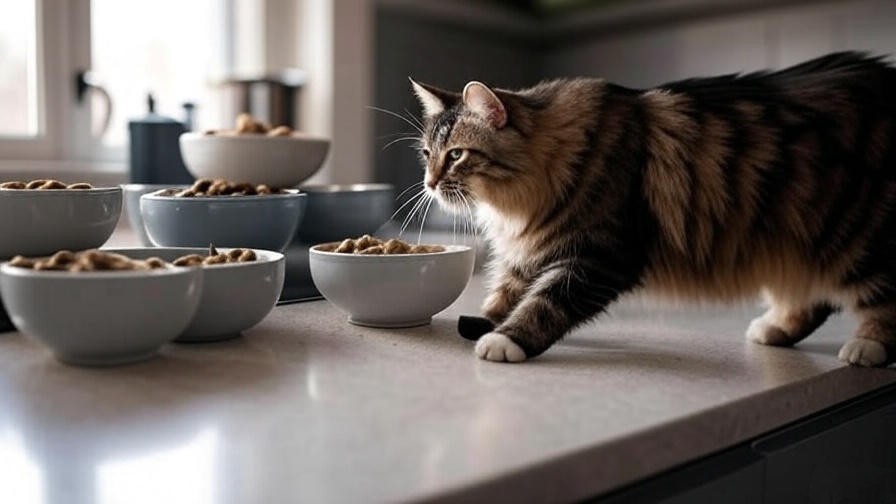
Supporting Joint and Bone Health
Maine Coons’ large frames put extra stress on joints, increasing the risk of hip dysplasia or arthritis. Diets rich in omega-3 fatty acids (from fish oil or salmon) and supplements like glucosamine and chondroitin can reduce inflammation and support mobility. Look for foods labeled “joint health” or add a vet-approved supplement.
Case Study: Sarah, a Maine Coon owner from Oregon, noticed her 8-year-old cat, Max, moving stiffly. After switching to a diet with added glucosamine and omega-3s, Max’s mobility improved within weeks, allowing him to leap onto his favorite perch again.
Preventing Obesity in Maine Coons
Maine Coons love to eat, but their size makes them prone to obesity, which exacerbates joint and heart issues. Maintain a healthy weight by measuring portions, avoiding free-feeding, and using interactive toys to encourage activity. A body condition score (BCS) of 4-5/9 (visible waist, slight abdominal tuck) is ideal.
Tip: Use puzzle feeders to slow eating and stimulate your Maine Coon’s hunting instincts, keeping them active and engaged.
Addressing Common Health Conditions
- Heart Health: Maine Coons are prone to HCM, a genetic heart condition. Diets high in taurine (found in meat and fish) and L-carnitine support cardiac function. Avoid low-quality foods lacking these nutrients.
- Urinary Health: Adequate hydration prevents urinary tract infections and kidney issues. Wet food and water fountains encourage fluid intake.
LSI Keywords: Maine Coon health issues, feline joint health, cat obesity prevention.
Foods to Include in a Maine Coon’s Diet
High-Quality Protein Sources
As obligate carnivores, Maine Coons thrive on animal-based proteins. Opt for foods with chicken, turkey, salmon, or organ meats (e.g., liver) as primary ingredients. These provide essential amino acids for muscle maintenance and energy.
Example: A high-protein wet food might include “chicken, chicken broth, turkey liver” to meet your Maine Coon’s needs.
Healthy Fats for Energy and Coat Health
Maine Coons’ lush coats require healthy fats like omega-3s and omega-6s, found in fish oil, salmon, or chicken fat. These fats also provide energy for their active lifestyles. Avoid foods with low-quality fats (e.g., “animal fat” with no specific source).
Tip: Add a teaspoon of salmon oil to wet food weekly for a glossy coat and improved skin health.
Safe Treats and Snacks
Treats should be limited to 10% of daily calories. Opt for freeze-dried meat treats or low-calorie options like dehydrated chicken. Avoid human foods like dairy, which can cause digestive upset.
Recipe: Homemade Tuna Bites
- Ingredients: 1 can tuna in water (drained), 1 egg, 1/4 cup oat flour.
- Instructions: Mix, form into small balls, bake at 350°F for 15 minutes. Cool before serving.
Foods to Avoid for Maine Coons
Toxic and Harmful Foods
Certain foods are toxic to all cats, including Maine Coons, and their large size doesn’t make them less vulnerable. Avoid feeding your Maine Coon chocolate, grapes, raisins, onions, garlic, or anything containing xylitol (a common sweetener). These can cause severe issues like kidney failure, anemia, or gastrointestinal distress. Dairy products, despite popular belief, are poorly digested by most cats and can lead to diarrhea.
Warning: Even small amounts of toxic foods can be dangerous. Keep human snacks out of reach, especially during social gatherings when Maine Coons’ curious nature might lead them to investigate.
Low-Quality Commercial Foods
Not all cat foods are created equal. Low-quality commercial foods often contain fillers like corn, wheat, or soy, which provide little nutritional value and can contribute to weight gain or allergies. Avoid products with vague ingredients (e.g., “meat by-products”) or artificial preservatives like BHA or BHT. Instead, choose foods with named protein sources (e.g., “chicken” or “salmon”) and minimal additives.
How to Read Labels: Look for foods meeting AAFCO standards, with protein as the first ingredient and no more than 10% carbohydrates on a dry matter basis.
Risks of Overfeeding Treats
Maine Coons’ hearty appetites make them prone to begging for treats, but overindulgence can disrupt their diet and lead to obesity. Treats should not exceed 10% of their daily caloric intake (e.g., about 20-30 kcal for a 15-pound cat). Excessive treats can also cause digestive issues, especially if they contain fillers or artificial flavors.
Practical Tip: Use treats as rewards during training or playtime to keep your Maine Coon engaged without overfeeding.
LSI Keywords: toxic foods for cats, Maine Coon food safety, low-quality cat food risks.
Feeding Tips for Maine Coon Kittens vs. Adults vs. Seniors
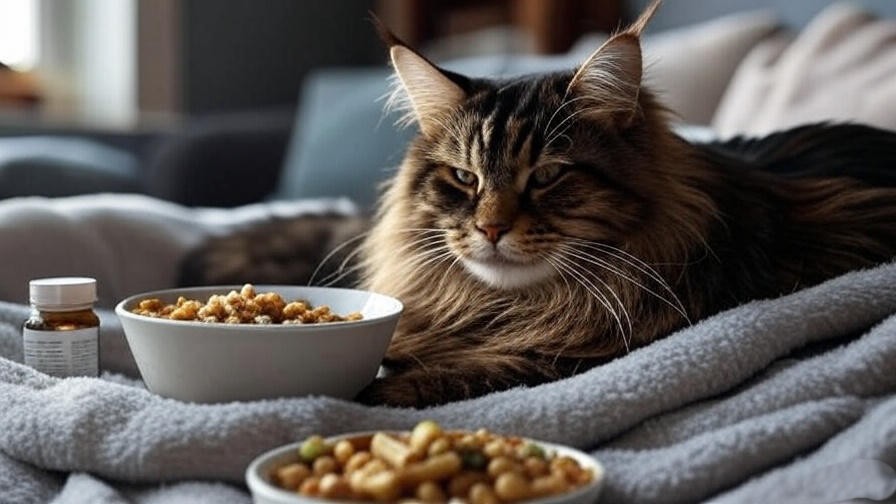
Kitten Nutrition (0-3 Years)
Maine Coon kittens grow rapidly and need a calorie-dense, nutrient-rich diet to support their development. Feed kitten-specific formulas with high protein (35-40%) and fat (20%) to fuel their growth and energy. Offer 4-6 small meals daily to prevent digestive overload, as their stomachs are still developing. Kitten foods should also include DHA for brain and eye development.
Example Schedule: 1/4 cup wet food 4 times daily, plus 1/8 cup dry kibble for snacking, adjusted based on weight and activity.
Adult Nutrition (3-10 Years)
Adult Maine Coons need a balanced diet to maintain muscle mass and prevent weight gain. Feed 2-3 meals daily, with portions tailored to their weight and activity level (e.g., 300-400 kcal for a 15-pound cat). Focus on high-protein, moderate-fat foods to support their active lifestyle and luxurious coat. Regular weight checks ensure they stay within a healthy range.
Tip: Use interactive feeders to mimic hunting, keeping your Maine Coon mentally stimulated and physically active.
Senior Nutrition (10+ Years)
As Maine Coons age, their metabolism slows, and they may develop joint or dental issues. Choose senior-specific foods that are easy to digest and lower in calories (e.g., 250-350 kcal daily for a 15-pound senior). Joint supplements like glucosamine and wet food for hydration become even more important. Monitor for signs of reduced appetite, which could indicate dental or health problems.
Example: Jane, a Maine Coon owner, switched her 12-year-old cat, Luna, to a senior wet food with added omega-3s, improving Luna’s mobility and coat shine within a month.
LSI Keywords: Maine Coon kitten diet, adult cat nutrition, senior cat feeding tips.
Hydration and Its Role in Maine Coon Health
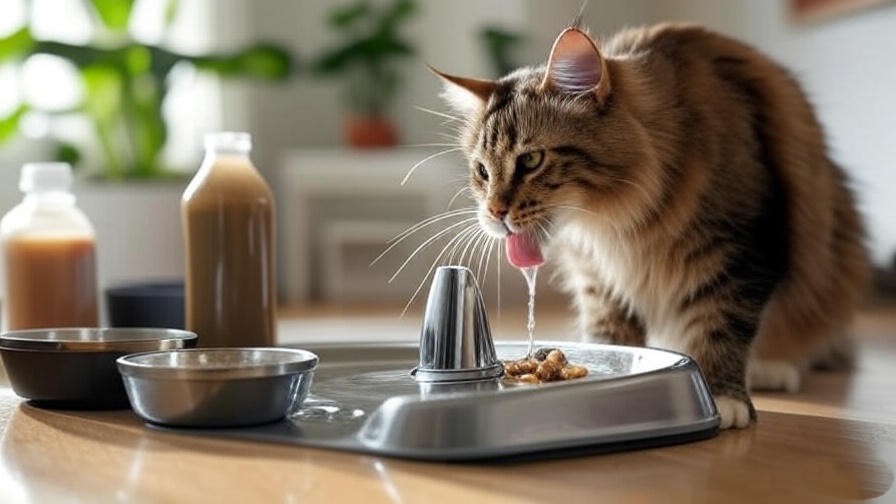
Why Hydration Matters
Maine Coons are prone to urinary tract issues and kidney disease, making hydration a cornerstone of their health. Adequate water intake helps flush toxins, prevents crystal formation in the bladder, and supports kidney function. Maine Coons often love water, splashing in bowls or drinking from faucets, which can be leveraged to encourage hydration.
Veterinary Insight: Dr. Emily Carter, a feline specialist, states, “Hydration is critical for Maine Coons, as their size increases the risk of urinary issues. Wet food and water fountains can make a significant difference.”
Practical Hydration Tips
- Cat Fountains: Maine Coons are drawn to running water. A pet fountain encourages drinking by mimicking a natural water source.
- Wet Food: Incorporate wet food (70-80% moisture) to boost fluid intake. Aim for at least 50% of their diet to come from wet food.
- Flavor Boosters: Add low-sodium chicken broth or tuna water to meals for picky drinkers, ensuring no harmful additives like onion or garlic.
Tip: Place multiple water stations around your home to make drinking convenient and appealing.
LSI Keywords: cat hydration tips, Maine Coon urinary health, feline water intake.
Supplements for Maine Coons: Do They Need Them?
Common Supplements for Maine Coons
Supplements can enhance a Maine Coon’s diet, especially for specific health concerns:
- Omega-3 Fatty Acids: Support coat health, reduce inflammation, and promote joint mobility. Fish oil or krill oil are excellent sources.
- Probiotics: Improve gut health and digestion, especially for cats transitioning diets or with sensitive stomachs.
- Glucosamine and Chondroitin: Support joint health, crucial for preventing or managing arthritis in this large breed.
Example: A vet-recommended glucosamine supplement (e.g., 100 mg per 10 pounds daily) can improve mobility in older Maine Coons.
Consulting a Veterinarian
Never start supplements without veterinary guidance, as over-supplementation can cause imbalances (e.g., excess vitamin A can be toxic). A vet can assess your Maine Coon’s needs based on age, health, and diet. Bloodwork may be recommended to check for deficiencies.
Expert Insight: Dr. Carter advises, “Supplements should complement, not replace, a balanced diet. Always consult a vet to tailor them to your Maine Coon’s unique needs.”
LSI Keywords: Maine Coon supplements, feline joint supplements, cat probiotics.
Transitioning Your Maine Coon to a New Diet
Why Gradual Transitions Are Key
Switching foods abruptly can cause digestive upset, food aversion, or stress in Maine Coons. A gradual transition over 7-10 days helps their digestive system adjust. Start by mixing 25% new food with 75% old food, increasing the new food proportion every 2-3 days.
Transition Plan:
- Days 1-3: 25% new food, 75% old food.
- Days 4-6: 50% new food, 50% old food.
- Days 7-9: 75% new food, 25% old food.
- Day 10: 100% new food.
Troubleshooting Picky Eaters
Maine Coons can be finicky, especially with new foods. If your cat refuses to eat:
- Warm wet food slightly to enhance aroma.
- Mix in a small amount of tuna or low-sodium broth to entice them.
- Offer food in a quiet, stress-free environment.
Case Study: Mark, a Maine Coon owner, struggled to switch his cat, Bella, to a high-protein diet. By warming the food and adding a sprinkle of freeze-dried chicken, Bella began eating eagerly within a week.
LSI Keywords: cat diet transition, Maine Coon picky eater, feline food changes.
FAQs About Maine Coon Diets
Q1: How much should I feed my Maine Coon daily?
A: Portions depend on weight and age. A 15-pound adult needs about 300-400 kcal daily, split into 2-3 meals. Use a feeding chart and adjust based on activity and body condition.
Q2: Can Maine Coons eat human food?
A: Most human foods are unsafe. Stick to cat-safe treats like cooked chicken or fish. Avoid toxic foods like onions, garlic, and dairy.
Q3: What’s the best food for a Maine Coon with allergies?
A: Limited-ingredient diets or hypoallergenic foods (e.g., duck or venison-based) work well. Consult a vet for allergy testing and tailored advice.
Q4: How do I know if my Maine Coon is overweight?
A: Check for a visible waist and slight abdominal tuck. A vet can assess body condition score (ideal: 4-5/9).
Q5: Are grain-free diets better for Maine Coons?
A: Grain-free isn’t necessary unless allergies are present. Focus on high-protein, low-carb foods with minimal fillers.
LSI Keywords: Maine Coon diet FAQs, cat food allergies, feline weight management.
Conclusion
A tailored Maine Coon diet is the foundation of a healthy, happy life for these gentle giants. By prioritizing high-quality protein, healthy fats, and joint-supporting nutrients, you can prevent common health issues like obesity and heart disease while keeping your cat’s coat glossy and energy high. Use the feeding tips, portion guidelines, and hydration strategies in this guide to create a nutrition plan that suits your Maine Coon’s unique needs. Consult your veterinarian for personalized advice, and share your experiences with other Maine Coon owners in the comments below. For more tips, download our free Maine Coon diet checklist or explore related articles on grooming and health!

